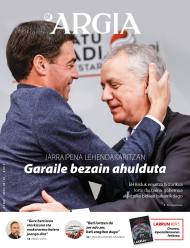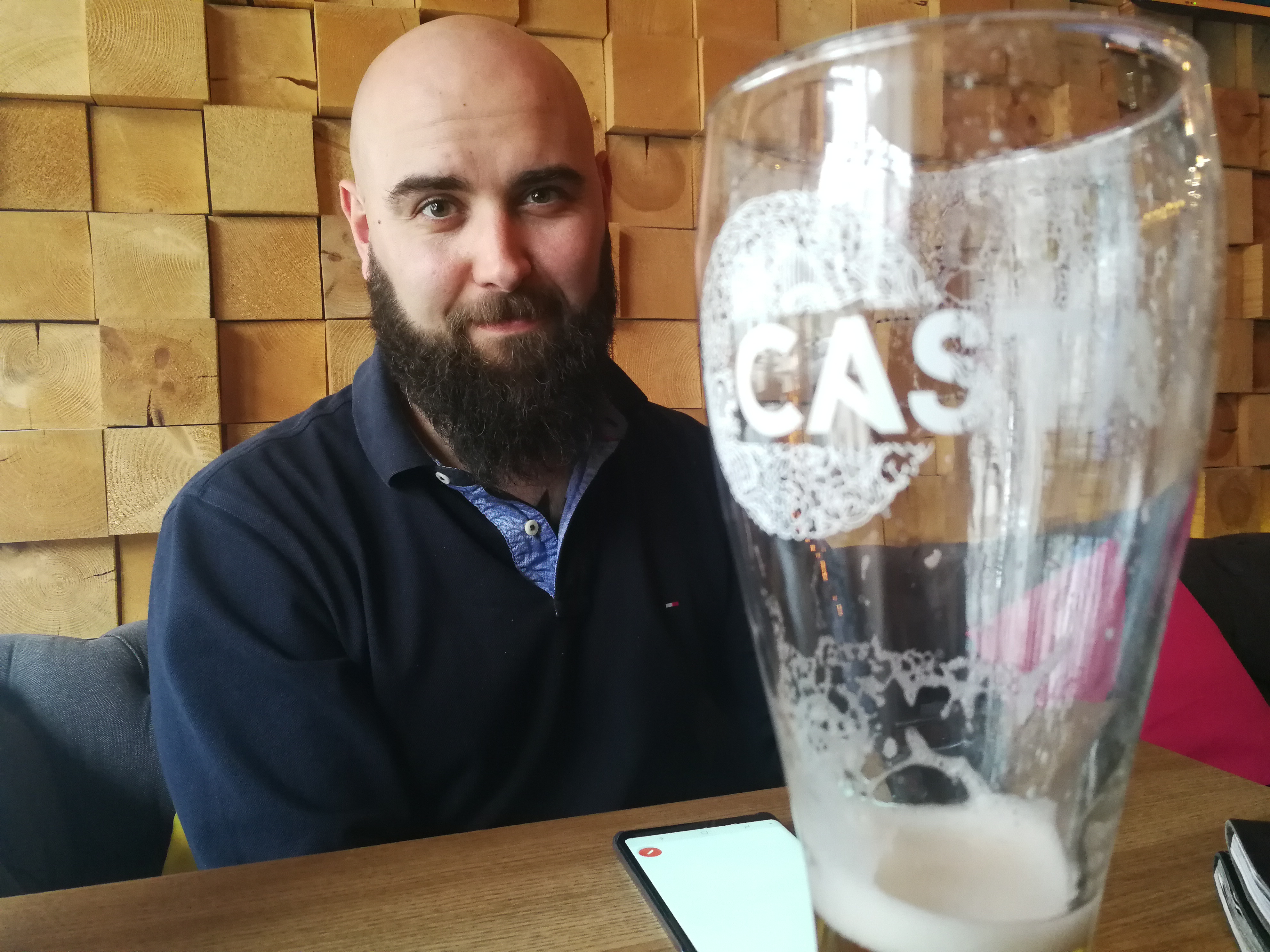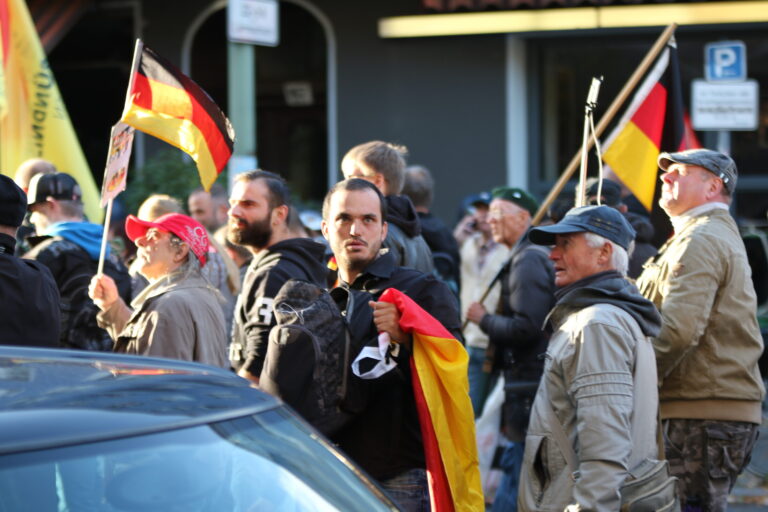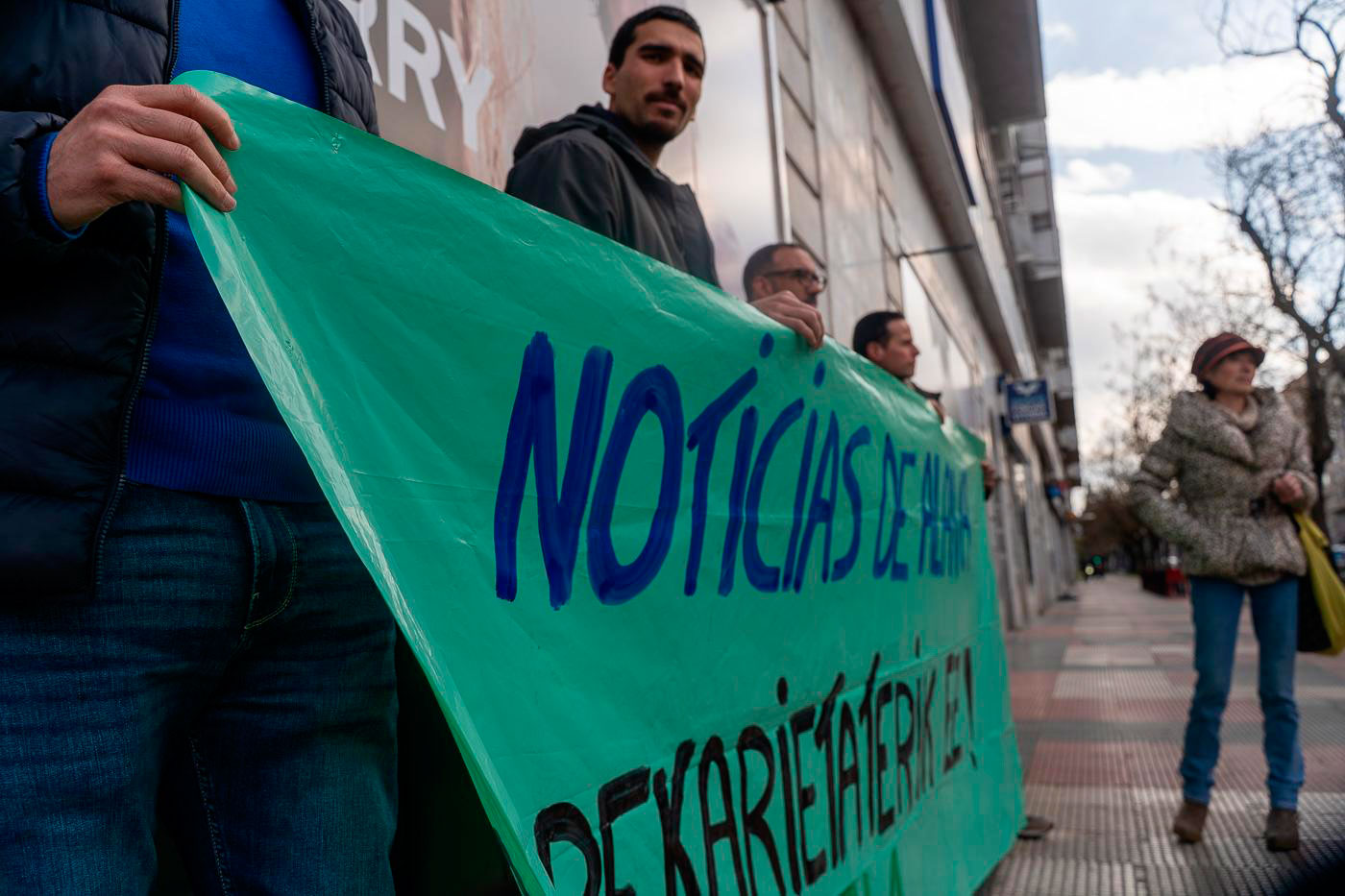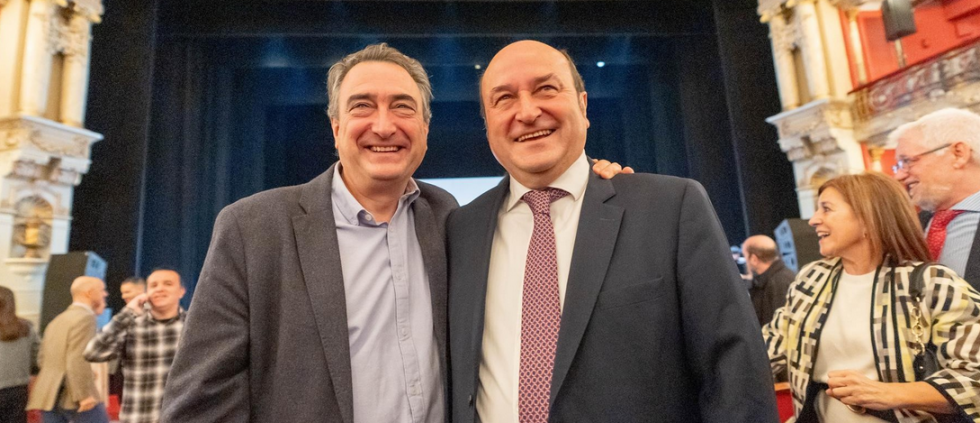"The future of our people and language will go together"
- Gara will be 25 years old this year. It was not easy. Despite the measure of the technological revolution, the arbitrary barriers agreed by the judges of the Spanish courts have conditioned daily life. A miracle, according to director Iñaki Soto, showing realities to change the world.

Iñaki Soto Nolas. Pamplona, 1975
He's director of the Gara newspaper since 2011. He was a student of the Ikastola Municipal de Pamplona, and remembers that era, the atmosphere of the class formed by several and others. He studied philosophy, from the university to journalism, that is, to the direction of Gara, and since then he is present in writing, writing and reading the journal every day, but looking at the future of this country.
Gara will be celebrating 25 years this year.
The miracle is that we are alive. We are a plant that nobody expected, a rare species that appears in textbooks and is going to disappear. However, after 25 years, in addition to textbooks, we are on the street every day, alive, and that is certainly a celebration. But this does not mean that we are still not a “rare” means of communication. We're working in a very complicated environment. On the one hand, the world of the media itself, and on the other, this new Basque Country and its evolution. Publishing a newspaper is a miracle.
Even more so if we take into account the winds coming from Spain: in 2000, Judge Baltasar Garzón issued a decree that determined the succession of companies between the Orain-Egin and EKHE-Gara groups, and then the former made the second pay the debt it had to the Social Security. That hasn't helped you...
This has, above all, conditioned our competitive potential. I think that is the most serious thing. There has been no equal opportunities. First, we were closed [Egin egunkaria], and since then they have been under surveillance for sixteen years in an absolutely anomalous situation. I believe that throughout the Spanish State there is another case such as ours, in Andalusia, where a naval company took over. If not, there are no cases like ours across Europe: there are no media that have been on probation for sixteen years. As for repression, I do not know of phenomena like Gara in the history of the media.
He says he has been constrained by opportunities to compete.
Yes, because that repression has conditioned us on advertising, aid and many things. In these sixteen years we have had to replace colleagues who have suffered long-term beatings, because we did not have the help that any company normally receives, that is, the resolution of the Spanish courts. When we agreed with Social Security to pay three and a half million euros, saying that every six months we would pay half a million, I think many lost the wager, thinking that we would not be able to pay that amount. We therefore have something to celebrate, of course!
What should the director of Gara say about Egin?
I cannot speak for them. Salu [Javier Salutregi] was the last director and observed the treatment he was given, his revenge, the judgment of one and the jail of the other. The worst thing, though, was to steal the trade from him. I'm no one to speak on his behalf, he gives me hot dogs. That said, Gara is a second or third part of a tradition. This tradition has been built: it began to be built before Franco's death and continued to build later. I think we have a very special social pulse in this country, and that pulse is still there.
What do you mean? What is a “special social pulse”?
I went abroad and saw that the other oppressed peoples do not have their own media. They do not have the capacity to have the media like ours. In our case, look at how many of us have and how they have come here. We are not the continuation of Egin, but we are part of his succession, we are part of his legacy. In this, Egin and Gara are part of the same heritage, and that is what we have always tried to express, because people have to understand it. For example, the young journalists working in our country were not yet born when Gara was born. 25 years is a long time in a person's life, but very little in a people's life.
.jpg)
And how do we convey that succession to the young journalists who were not yet born when Gara was born?
I refer many times to David Simon, author of The Wire. He is a journalist, in fact, and I heard him the best definition of the writing of a newspaper that I have heard: “Writing is the hideaway from the institutional memory of a journalism project.” Transmission occurs in the drafting work, even very naturally. I do not think there is any other way of transmitting that institutional memory. We need books of style, training, proselytizing… but this is a trade, learned at work.
The founding principles of Gara refer to the objective of overcoming conflict. There is no doubt that steps have been taken.
The conflict we have historically experienced has been transformed. In this respect, it has been overcome, but, nevertheless, the conflict is still there. In short, here we have first- and second-class citizens. Surely this happens in all societies: it's a gender gap, or a class struggle, or more. The fact that there are first- and second-class citizens here is not the exclusive property of our people. However, our people are characterized by the fact that some have their constitutionally armored political project, while others are prohibited by the constitution. Our votes are therefore not the same, in this respect they are first-class citizens and we are second-class citizens.
"Our goal must not be to fight, but to succeed, and for that it must achieve broad majorities"
Some constitutionally armored, some constitutionally prohibited.
If we take into account different territories, I would say that here [CAPV], the minority has the right of veto. There is the conflict: we have not been told what the legal conditions are for carrying out our project. That's the advantage, and against it, quite a job! Since 1512, or we have already experienced the conflict and will continue to do so later. In relation to what was said in that founding editorial of Gara, I think things have happened as we said. We are committed to overcoming this political phase in this country. Within independence, we advocated a change of strategy, from journalism, because we have no other means: we do not vote inside the parties, we are an autonomous body, nobody decides what we are going to do, not what we are going to say, and what we say does not affect anyone's decisions by itself.
On the road to overcoming the conflict, since 2012 we have a different phase...
Yes, we decided it was time to work differently, and I believe that this has been a change in the historical phase of the conflict. But there is always the front page of our newspaper: we still have 140 prisoners in 2024! It's been over a decade [since ETA left the guns forever], and we're on it. And as we said in that editorial, a free people is a people without prisoners, and we have not yet achieved that. As long as the consequences of the conflict persist, we will continue to play a role. And yet our goal must not be to fight, but to succeed, and to do so it must achieve broad majorities and make a strong social, political, economic and cultural offer.
In what language should victory be achieved? In prose, in what language should Gara act? In languages spoken by people. The newspapers here have been created according to the administrative structures. On the one hand, the
media of governments and, on the other, the newspaper that works in linguistic terms. Ours is a mythological, Basque animal, which speaks at least three languages. And I would say that we should also include the fourth and fifth languages in the equation. Clearly, the situation of these languages is not the same and the same. We therefore have a political intention which must be structured in real terms, because otherwise we may be satisfied, but that is detrimental to our political purposes.
Would it be harmful for Gara to make daily use of the Basque language? No. It is counterproductive not to decide how to strengthen
our structures to achieve our objectives. It is also damaging to make a moralistic reading of this matter. Our objective is to disseminate, strengthen the Basque country and to do so we must evaluate our policies. For example, who is the recipient of AEK?… Spanish! How should AEK be directed to its recipient to enroll in AEK and Euskaldunice? Spanish. If not, you do not understand! That is what happens at all other levels. Yes, you can go to Vitoria, for example, and do a rally within an election campaign: “We are Basque and we will not speak in Basque!” But in this case, you are not asking people to vote, you are asking people to know Basque. I do not want to make a moralist reading of the Basque country.
What is “moralistic reading”? I, in my journalistic career, have done most in Euskera, both on the radio and in the articles I have signed by my name in the newspaper. I also have to do editorials, and most of them I've done in Spanish. But I told you, most of the texts bearing my signature will be seen in Basque. But Gara is not tied to my particular desires, it's not looking at the world I wanted. We don't live in a kibutz, a village is not a kibutz. Working for the people requires responsibility, requires responsibility, not satisfaction. My particular
enthusiasm cannot be alien to the reality of this country. [Arnaldo] As Otegi said, we have to be effective.
So what do you think
about the media in Basque? Look at the amount of energy and money we invest, and the effort we make at ETB1, Euskadi Irratia, Berria… For doing in Basque Country Gara receives money, receives Berria, collects ARGIA and eleven other media. That's where the investment is, and you probably have to make more investment. But perhaps the balances we make are not correct, perhaps we should act differently. I have no doubt that an effort is being made and yet I believe that we should analyse the results of that effort. Do we have to be monolingual to work for the Basque?
Yes and no. For example, in respiratory areas yes, but we do not live in a respiratory zone. We are the newspaper of a people, where three languages are also spoken. When the media of the continental Basque Country have been placed by their own decision and autonomously, they have been placed in French: and by our impulse, also in Basque. I therefore believe it is time to dispense with prejudice, with
false premises and to make a real analysis of what has been done and what has not been done. We do the radio Naiz, which has a great presence of the Basque Country, because the consumer is also young and knows Basque; today 8 weekly, the same, we do it in Basque; the monthly travel magazine, only in Basque; we also participate in a television, in Basque…
"Gara must speak in the languages in which people speak in our country"
That in your favor -- let's have a political debate, without
false premises, and let's analyze the data and then evaluate what we've done, because it's vital, because our language is still in danger, and because our country is also in danger. Therefore, in our vision, historically, the future of our people and the future of language will go together, not necessarily at the same time, but at the same time, and cannot be saved without each other. I am even using a wrong political thesis, but we see this, we are in that conviction and we act accordingly. On the other hand, I believe that our people will never be monolingual. So, “...and done!”, little. “...or mate”, better not. If possible, live; and if possible, live long.
What do you think about institutional advertising and the distribution of the money that comes from this institutional advertising? The tragedy is that institutional advertising helps to survive. The criterion is “audience”, but if the inhabitants of
a village bathe in the municipal pool and one day there is no rescuer, all the inhabitants of that village will have to be informed, right? Not just those who read a particular newspaper. The objective of institutional advertising must be twofold: on the one hand, to inform the public, not the citizens who read certain newspapers, and on the other, to try to promote equality in the sector. One of the objectives of the Administration must be to promote the diversity of the press, and the free market – which is what is “public-private” and discourse – but this is not achieved in our sector.
.jpg)
In 2011, when he was appointed director of Gara, paper newspaper consumption was so high. Today you don't see anyone picking up the newspaper under his arm. I was one of the few with the newspaper at the Iruñea demonstration in the Aberri Eguna. I'm the director of Gara, it's part of my outfit to bring the newspaper. I hear it many times: “I read the newspaper on my phone.” I forgive, but I do not believe. Or, I think, that's right, but we can't think that the reading you do on your phone
has the same content or quality as the one you do on paper. This way of reading on the mobile affects our public debate, and our wakefulness, our domestic relations, intergenerational coexistence, because according to the line managers it is not possible to argue seriously. This form of reading has profound consequences that we cannot analyze using parameters 30 years ago.
What is the importance of journalism today? I think one of the main functions of journalism is the
control of power. But power doesn't like that journalism control. Journalism is against power, the journalist departs from the institutions, structures and macrostructures that have such important control. That's what some journalists do, because others just write the memoirs of the lords. We have two, on the one hand, like Pablo González, for his journalistic work in prison, and on the other, the chroniclers of the court: “Yesterday the president of [ANV] went for a walk with the dog and kissed his wife on the front...”
You also make friends -- yeah! Others will have to judge my work and say what kind of director, but it is also to judge politicians, and I think Urkullu has
certainly been a very bad lehendakari. My mother says to me many times, “How long has it been for you to be a director!” And it is true: when I was appointed director, we were still in full conflict; we have told the arrest of Arnaldo Otegi and the subsequent process, the National Court of [Spain] and others; we met the Cabacas case, and we were brought before the judge for giving that information; before the disarmament we were in Baiona, among the signatories was Gara, among the signatories, we have dealt with the revolution of the dog. There are no rights.
* * * * * * *
Alternance (I) “The PNV, or [Joseba] Egibar
and [Xabier] Barandiaran, said that one day the Abertzale left was going to win the elections, and that had to be taken normally. This is an alternation scheme. That is what happens in normal villages. But when the alternation occurred in Gipuzkoa, the PNV realized that the best way to reach power is to be in power, not to leave power...”
Alternance (II) “(...) And that is what happens in Gipuzkoa: whoever is charged with sending orders does not rule because the minority has the right to veto. If there is no alternation, at least alternatives must be invented. I believe that the situation is rather serious, that we are
living in a historic moment and that we have to hold discussions about the country in order to reach agreements. But traditional powers are very afraid not only of the alternative, but of the alternation itself.”
LAST WORD
“I’m very critical of the reporter’s epic, romantic image. I like journalism centered on writing, teamwork. We see war correspondents, but not many of their colleagues behind us in order to work. I like the newspaper culture of writing and not the male, epic and saving image of the war journalist. I like written journalism and journalists who write well, and there are
things like that.”
Apirilaren 24an, ETB1ean, jendeak aspalditik eskatzen zuen programa eredu bat estreinatuko da: Linbo, late night formatuko ordubete inguruko saioa, gazteek eta gazteentzat egina.
"Ask for your turn and we'll join you," the willing and cheerful announcer who speaks from the studios tells the young correspondent who walks through the streets of Bilbao. The presenter immediately addressed the audience. "In the meantime, we are going to Pamplona..." They opened... [+]
I have to confess a sin here. Four years ago, I introduced a new habit into my life: on Sunday nights, I began to watch the ultra-right television channel CNews, which spreads continuous "information" like a cannon of shit. What was at first half an hour a week, has at any given... [+]
Martxoaren 14an Donald Trumpek agindu exekutibo bat sinatu zuen, hainbat berri agentziak jasotzen duten diru kopurua asko murrizteko. Kaltetuetako bat United States Agency for Global Media (USAGM) izan zen eta, ondorioz, Voice of America (VOA), Radio Free Europe/Radio Liberty... [+]
2022ko ekainaren 7an, Directa-k serie luze bateko lehen polizia infiltratuaren kasua argitaratu zuen. Martxoaren 5ean, Belen Hammad fikziozko izena erreta geratu zen, polizia-argotean dioten bezala. Jada hamar dira Directa, El Salto eta El Diario-k azken hiru urteetan argitara... [+]
USAIDen inguruko txolopotearen ondoren, espero beharrekoa zen. Baina, hala ere, urte askotan haien jarraitzaileak izan garenok, samin-puntu batekin hartu dugu albistea. Martxoaren 15ean, Trump administrazioak, kolpetik, erabat itxi baitu United States Agency for Global Media... [+]
Varsoviako Barrutiko Auzitegiak argudiatu du González jada ez dagoela Polonian, eta ezin dutela jakin noiz aterako den Errusiatik. Auzitegiak ez du kazetari nabarniztarraren aurkako bestelako prodezurarik abian jarriko.
Gaur abiatu da Bizi Baratzea Orrian kide egiteko kanpaina. Urtaro bakoitzean kaleratuko den aldizkari berezi honek Lurrari buruzko jakintza praktikoa eta gaurkotasuneko gaiak jorratuko ditu, formato oso berezian: poster handi bat izango du ardatz eta tolestu ahala beste... [+]
Alemaniako Poliziak asteleheneko gertakariaren arrazoiak "politikoak" zirela baztertu duen arren, 35 urteko Alexander Scheuermann Ring Bund talde neonaziko kide zen. Bi hildako eta hamar zauritu utzi dituen atentatuaren egileak sare sozialetan "gorroto mezuak"... [+]
Lan baldintzen "prekarietatea" salatzeko kontzentrazioa egin zuten asteartean egunkariaren egoitzaren aurrean. Abenduaren 2tik sindaura greban daude langileak eta mobizlizazioak "areagotzea" erabaki dute orain.
Urtea baino gehiago da Olatz Simonek –EITBko berriemailea Parisen, garaian–, orrialde hauetan bertan ohartarazi zigunetik Bruselak kazetariari lanbideaz erakusten dionaz. Eta halaxe joan gatzaizkio galdezka Amaia Portugali. Bruselan gure irrati publikoak duen... [+]
Langileek salatu dute zuzendaritzak ez diela lan baldintzen gaiari heldu nahi izan eta enpresak nahiago izan duela Gaztea Sariak ekitaldia bertan behera utzi, “horrek sortutako albo-kalte ekonomiko eta sozial guztiekin”, arazoari irtenbidea eman baino.
Joan den asteartean La Vanguardia-n argitaratutako artikuluan egin zuen proposamena Txema Montero abokatu bizkaitarrak. 30 urtez Deia egunkariko kolaboratzailea izan da eta lehenik hara bidali zuen bere artikulua, baina egunkariak ez zion argitaratu.









